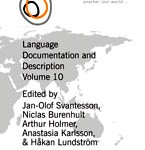Volume 10 of Language Documentation and Description is now available for purchase from the SOAS online store. Until 31 January 2012 copies may be ordered for £10 (including postage and packaging), which is 25% off the regular retail price.
Volume 10 is edited by Jan-Olof Svantesson, Niclas Burenhult, Arthur Holmer, Anastasia Karlsson and Håkan Lundström, and is a special collection of papers dealing with:
• language and music
• prosody
• grammar and meaning
The papers arise from a conference held at Lund University in September 2010, and represent important contributions to the theory and practice of the field of language documentation by leading scholars and younger researchers. The volume is of interest to anyone concerned with documenting and describing languages.
The contents are:
- Introduction — Jan-Olof Svantesson, Niclas Burenhult, Arthur Holmer, Anastasia Karlsson and Håkan Lundström
- Song-poetry of Central Australia: sustaining traditions — Myfany Turpin
- Language and music in the songs of Minto, Alaska — Siri G. Tuttle
- Tone in speech and singing: a field experiment to research their relation in endangered languages of North East India — Stephen Morey & Jürgen Schöpf
- Conversation in Upper Tanana Athabascan: syntactic and prosodic patterns — Olga Lovick & Siri G. Tuttle
- Intonation in Ryukyuan: with reference to modality, syntax, and focus — Yasuko Nagano-Madsen
- The Wichita pitch phoneme: a first look — David S. Rood
- Assessing music shift: adapting EGIDS for a Papua New Guinea community — Neil R. Coulter
- Elusive articles in Sulawesi: between syntax and prosody — René van den Berg
- Exploiting syntax to circumvent morphology: word order as a means for marking grammatical categories — Cynthia I. A. Hansen
- The increasing importance of animacy in the agreement systems of Ndengeleko and other Southern Coastal Bantu languages — Eva-Marie Ström
- The perception verbs in Lussese (Bantu J10): a matter of experience — Marilena Thanassoula
- Main clause TAM-marking in Ngarla (Pama-Nyungan), in comparison with two neighbouring languages — Torbjörn Westerlund
- Grammaticalization of tense and aspect in Mbugwe: a preliminary investigation — Vera Wilhelmsen
The volume of 330 pages is accompanied by a CD with 31 sound files referenced in the papers on language and music, and language and prosody.

 Follow
Follow
Here at Endangered Languages and Cultures, we fully welcome your opinion, questions and comments on any post, and all posts will have an active comments form. However if you have never commented before, your comment may take some time before it is approved. Subsequent comments from you should appear immediately.
We will not edit any comments unless asked to, or unless there have been html coding errors, broken links, or formatting errors. We still reserve the right to censor any comment that the administrators deem to be unnecessarily derogatory or offensive, libellous or unhelpful, and we have an active spam filter that may reject your comment if it contains too many links or otherwise fits the description of spam. If this happens erroneously, email the author of the post and let them know. And note that given the huge amount of spam that all WordPress blogs receive on a daily basis (hundreds) it is not possible to sift through them all and find the ham.
In addition to the above, we ask that you please observe the Gricean maxims:*Be relevant: That is, stay reasonably on topic.
*Be truthful: This goes without saying; don’t give us any nonsense.
*Be concise: Say as much as you need to without being unnecessarily long-winded.
*Be perspicuous: This last one needs no explanation.
We permit comments and trackbacks on our articles. Anyone may comment. Comments are subject to moderation, filtering, spell checking, editing, and removal without cause or justification.
All comments are reviewed by comment spamming software and by the site administrators and may be removed without cause at any time. All information provided is volunteered by you. Any website address provided in the URL will be linked to from your name, if you wish to include such information. We do not collect and save information provided when commenting such as email address and will not use this information except where indicated. This site and its representatives will not be held responsible for errors in any comment submissions.
Again, we repeat: We reserve all rights of refusal and deletion of any and all comments and trackbacks.